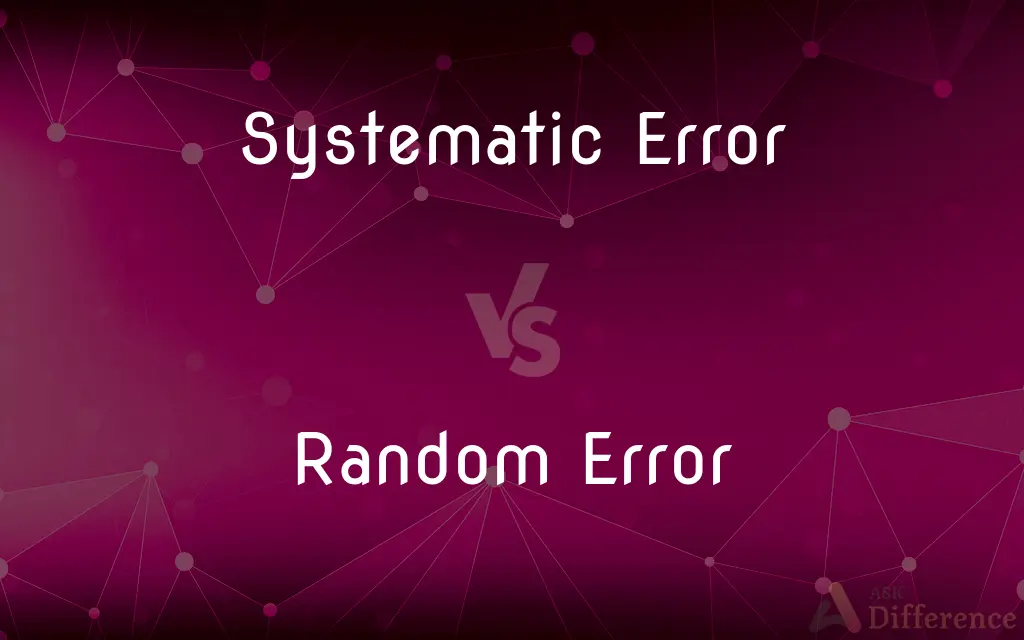Systematic Error vs. Random Error — What's the Difference?
By Tayyaba Rehman — Published on October 29, 2023
Systematic Error is a consistent, repeatable error associated with faulty equipment or a flawed experiment design, while Random Error is unpredictable and typically occurs due to variability or noise in the data.

Difference Between Systematic Error and Random Error
Table of Contents
ADVERTISEMENT
Key Differences
Systematic Error invariably entails a discernible pattern, emerging from imprecise measurements or flawed procedures, thereby persistently impacting results in a particular direction, either negatively or positively. In stark contrast, Random Error remains inherently unpredictable and possesses no discernible pattern, fluctuating around the true value without consistent bias, manifesting in varied measurements even under identical experimental conditions.
In a measurement context, Systematic Error uniquely contributes to a consistent deviation from the actual value, introducing a sustained bias that alters all measurements equally and predictably. Alternatively, Random Error remains intrinsically bound to statistical fluctuations, impacting measurements in an unpredictable manner, thereby obscuring the true value with variable deviations that do not exhibit a discernible pattern or direction.
With an intrinsic, predictable bias, Systematic Error unmistakably impacts results in a singular, consistent direction, providing a uniform deviation from the true value that permeates all observations. On the contrary, Random Error, imbued with inherent unpredictability, sporadically impacts observations without a consistent deviation direction, contributing to varied, unbiased fluctuations around the true value without a detectable pattern.
Systematic Error, emerging from inaccuracies in measurement tools or procedural flaws, invariably introduces a known, repeatable error, thereby providing a consistent deviation from the actual value across all measurements. Unlike Systematic Error, Random Error fails to provide a consistent deviation, introducing variable, unbiased fluctuations, arising from unforeseeable factors like observational noise, thereby producing different values in repeated measurements under identical conditions.
Given its repeatable, predictable nature, Systematic Error allows for potential identification and correction with appropriate calibration or procedural adjustments. Contrarily, Random Error, due to its fundamental unpredictability and lack of a consistent pattern, does not lend itself to simple correction or calibration, thus requiring statistical methods for treatment and analysis, highlighting the dichotomy in addressing and mitigating these two disparate error types.
ADVERTISEMENT
Comparison Chart
Nature
Consistent, repeatable
Unpredictable, variable
Source
Measurement/tool bias or flawed procedure
Inherent variability or observational noise
Impact on Repeated Measurements
Consistent bias
Variable deviations
Correctability
Identifiable and potentially correctable
Not directly correctable
Impact on Accuracy
Directly impacts accuracy
Affects precision
Compare with Definitions
Systematic Error
Consistent deviation from the actual value.
An incorrectly calibrated scale introduced a systematic error in the weight measurements.
Random Error
Fluctuations that occur without a discernible pattern.
The data displayed random error with values both above and below the mean.
Systematic Error
Bias that impacts all measurements consistently.
The systematic error consistently underestimated the distances measured.
Random Error
Unbiased deviations occurring in repeated measurements.
Despite maintaining controlled conditions, random error was evident in the varied results.
Systematic Error
Error that consistently skews results in a particular direction.
The systematic error in the study led to consistently higher recorded blood pressures.
Random Error
Noise that introduces non-systematic deviations in data.
Random error in the spectrophotometer readings caused inconsistency in the absorbance values.
Systematic Error
Error arising from inaccurate measurement tools.
The systematic error was due to a faulty thermometer reading.
Random Error
Error that occurs unpredictably in measurements.
Random error caused fluctuating temperature readings in the experiment.
Systematic Error
Predictable, repeatable error from a flawed procedure.
Using an outdated formula introduced systematic error into calculations.
Random Error
Variability that impacts measurements sporadically.
The scientist attributed the unexpected data points to random error.
Common Curiosities
Can Systematic Error be corrected?
Yes, Systematic Error can often be corrected by calibrating instruments or adjusting procedures.
What is Systematic Error?
Systematic Error is a consistent, predictable error in measurements due to faulty procedures or equipment.
How does Random Error occur?
Random Error occurs unpredictably, with variable deviations in measurements due to inherent noise or variability.
How can Random Error be reduced?
Random Error can be reduced by increasing sample size and employing statistical averaging.
Can Random Error be predicted?
No, Random Error cannot be predicted as it occurs sporadically without a consistent pattern.
How is Random Error typically addressed?
Random Error is addressed using statistical methods since it is not directly correctable.
What causes Systematic Error?
Causes of Systematic Error can include calibration errors, flawed procedures, or observer bias.
Does Random Error affect precision or accuracy?
Random Error affects the precision of measurements by introducing variability.
Is Systematic Error associated with precision or accuracy?
Systematic Error is associated with accuracy, as it consistently deviates from the true value.
How does Systematic Error affect data analysis?
Systematic Error introduces a consistent bias, skewing results and potentially leading to inaccurate conclusions.
What is an example of Systematic Error?
An example of Systematic Error is a miscalibrated scale always reading 5 grams too heavy.
Can Random Error be eliminated?
No, Random Error cannot be completely eliminated but can be statistically minimized.
Can Systematic Error be identified through repeated measurements?
Yes, Systematic Error can often be identified by observing a consistent bias in repeated measurements.
What is a common source of Random Error in observational studies?
Common sources of Random Error include inherent variability and unpredictable fluctuations in measurements.
What is a key difference between Systematic Error and Random Error?
Systematic Error is consistent and predictable, while Random Error is variable and unpredictable.
Share Your Discovery

Previous Comparison
Moment of Inertia vs. Polar Moment of Inertia
Next Comparison
Geyser vs. Water HeaterAuthor Spotlight
Written by
Tayyaba RehmanTayyaba Rehman is a distinguished writer, currently serving as a primary contributor to askdifference.com. As a researcher in semantics and etymology, Tayyaba's passion for the complexity of languages and their distinctions has found a perfect home on the platform. Tayyaba delves into the intricacies of language, distinguishing between commonly confused words and phrases, thereby providing clarity for readers worldwide.
















































